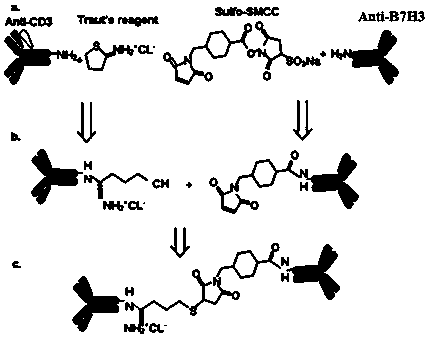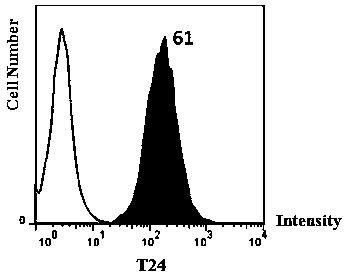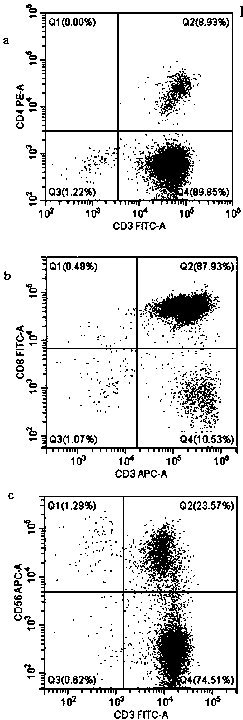Application for directionally killing bladder cancer cells T24 through CD3*B7H3 dual-specificity antibody
A bispecific antibody, bladder cancer cell technology, applied in the direction of antibodies, anti-tumor drugs, drug combinations, etc., can solve the problems of unsatisfactory survival rate after bladder cancer surgery, unable to curb tumor recurrence and drug resistance, etc.
- Summary
- Abstract
- Description
- Claims
- Application Information
AI Technical Summary
Problems solved by technology
Method used
Image
Examples
Embodiment 1
[0020] Example 1 cell culture
[0021] Human bladder cancer T24 cell line was purchased from ATCC cell bank. Cell lines were cultured in RPMI 1640 medium with 15% fetal bovine serum. Cells were cultured at 37°C in an incubator containing 5% carbon dioxide.
Embodiment 2
[0022] Example 2 Isolation of peripheral blood mononuclear cells and preparation of activated T lymphocytes (ATC) for cryopreservation
[0023] Peripheral blood mononuclear cells (PBMCs) were obtained by separating peripheral blood from healthy donors provided by Beijing Blood Bank by Ficoll density gradient centrifugation. 1 × 10 in RPMI-1640 medium supplemented with 10% FBS and 5 μg / ml anti-CD3 mAb (eBioscience, San Diego, CA, USA) and 100 IU / ml recombinant human IL-2 6 / ml cultured PBMC. The fresh medium required for cell culture contains 100IU / ml recombinant human IL-2. On day 13, ATC with expanded average expressing CD3+ (CD4+ and %CD8+) was cryopreserved for further use.
Embodiment 3
[0024] Example 3 Anti-CD3×anti-B7-H3 bispecific antibody (B7-H3Bi-Ab) was synthesized and conjugated to activated T cells
[0025] Anti-B7-H3 monoclonal antibody (R&D System, Minneapolis, MN, USA) was reacted with sulfo-SMCC, and anti-CD3 (OKT3, eBioscience) was reacted with Traut's reagent. Thaw cryopreserved ATC and mix with B7-H3Bi-Ab at 50ng / 10 6 Cells were concentrated for 30 min at room temperature and cells were subsequently washed to eliminate unbound antibody. Grayscale analysis of western blot bands was performed using ImagJ to calculate the conjugation rate.
PUM
 Login to view more
Login to view more Abstract
Description
Claims
Application Information
 Login to view more
Login to view more - R&D Engineer
- R&D Manager
- IP Professional
- Industry Leading Data Capabilities
- Powerful AI technology
- Patent DNA Extraction
Browse by: Latest US Patents, China's latest patents, Technical Efficacy Thesaurus, Application Domain, Technology Topic.
© 2024 PatSnap. All rights reserved.Legal|Privacy policy|Modern Slavery Act Transparency Statement|Sitemap



